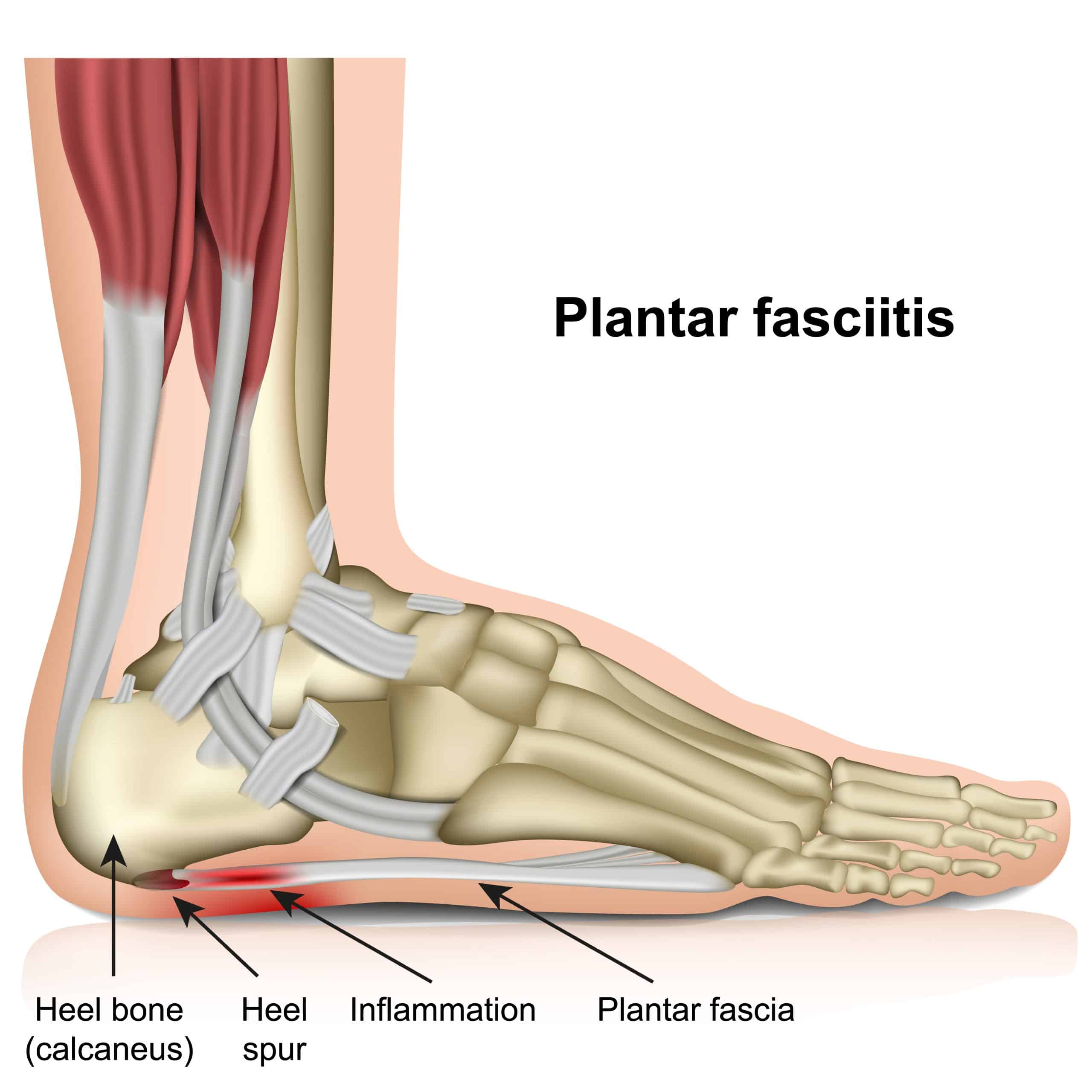VA Rating for Plantar Fasciitis Explained

In this post, we will be exploring how to get a VA Rating for Plantar Fasciitis.
In 2020, Plantar Fasciitis VA ratings range from 0% to 50% with breaks at 10%, 20%, and 30%.
A veterans final VA disability rating for Plantar Fasciitis depends upon the frequency, severity, and duration of symptoms, meaning, the more severe your symptoms, the higher the VA rating for Plantar Fasciitis.
There is also a bilateral factor—meaning veterans can get a higher VA rating for Plantar Fasciitis if they have the disability in both feet.
The highest possible scheduler VA disability rating for Plantar Fasciitis is 50%, which includes symptoms such as, extreme tenderness of the plantar surfaces of both feet not improved by orthopedic shoes or appliances.
Okay veterans – let’s take a minute to explore the law regarding the symptoms and impairment required to warrant a VA disability rating for Plantar Fasciitis.
Many veterans suffer from various foot conditions due to their military service, to include severe heel pain, aka, Plantar Fasciitis.
Also, both unilateral and bilateral Plantar Fasciitis are common secondary VA disability claims, especially Plantar Fasciitis secondary to lower extremity conditions such as knees, joints, hips, and back.
- Plantar Fasciitis in Veterans
- VA Rating for Plantar Fasciitis – Common Symptoms in Veterans
- WATCH: VA Disability Claims for Plantar Fasciitis (NEW Tips!)
- Is Plantar Fasciitis a VA Disability?
- VA Rating for Plantar Fasciitis from 0% to 50%
- VA Disability Rating Schedule for Plantar Fasciitis
- Plantar Fasciitis Secondary Conditions
- C&P Exam for Plantar Fasciitis
- About The Author
Plantar Fasciitis in Veterans
Plantar Fasciitis is one of the most common causes of heel pain in veterans.
It involves inflammation of the thick band of tissue that runs across the bottom of your foot and connects your heel bone to your toes (called the “Plantar Fascia”).

Do you think you might have Plantar Fasciitis?
Here’s a quick litmus test: If it feels like a knife is being jammed into the bottom of your heel, especially during the first few steps out of bed in the morning, or shortly after a workout, chances are you might have Plantar Fasciitis.
According to the Mayo Clinic, “Your plantar fascia is in the shape of a bowstring, supporting the arch of your foot and absorbing shock when you walk. If tension and stress on this bowstring become too great, small tears can occur in the fascia. Repeated stretching and tearing can irritate or inflame the fascia, causing severe heel pain.”
Common risk factors include age, long distance running (such as military PT), poor arch and heel support (e.g., military combat boots), obesity, and occupations that require a lot of standing (active duty military service, perhaps combat deployments).
VA Rating for Plantar Fasciitis – Common Symptoms in Veterans
Many veterans have or develop Plantar Fasciitis and common signs and symptoms include:
- Heel pain (especially after standing, walking, or running)
- Painful motion
- Tenderness
- Swelling
You may get some relief by icing, taking pain medications, wearing a brace, heal inserts in shoes, night splints, and in extreme cases, cortisone shots directly into the affected area.
WATCH: VA Disability Claims for Plantar Fasciitis (NEW Tips!)
⏩ 12:45 How are VA disability claims for Plantar Fasciitis rated?
⏩ 13:13 VA Ratings for Plantar Fasciitis in 2020
⏩ 15:15 Signs and symptoms to look for in your feet
⏩ 16:45 Plantar Fasciitis can be unbelievably painful, don’t downplay your symptoms
⏩ 19:00 Here are the common risk factors for Plantar Fasciitis
⏩ 20:55 What kind of Plantar Fasciitis treatments are available for you to do on your own?
⏩ 21:30 Request a referral from your primary care or VA doctor to see a Podiatrist.
⏩ 24:00 It’s important to note your foot pain may fluctuate over time
Is Plantar Fasciitis a VA Disability?
Yes, Plantar Fasciitis is a VA disability and it’s most often rated analogous to CFR 38, Part 4, VA Schedule of Ratings, Diagnostic Code 5276, Flatfoot, Acquired.
An important requirement for VA disability rating purposes is whether your foot condition is congenital or acquired.
“Congenital” means a disease or physical abnormality that’s been present since birth whereas “Acquired” means a disease or physical abnormality that developed after birth.
Congenital Plantar Fasciitis is NOT compensable or pensionable unless you’re claiming aggravation of a pre-service condition.
For example, perhaps you entered the military with flat feet, but never had Plantar Fasciitis.
If your military service aggravated your flat feet (made it worse), leading to Plantar Fasciitis (severe heel pain), you can still be rated and compensated under the law.
According to CFR 38, Part 3, §3.306 Aggravation of Preservice Disability, “A preexisting injury or disease will be considered to have been aggravated by active military, naval, or air service, where there is an increase in disability during such service, unless there is a specific finding that the increase in disability is due to the natural progress of the disease.”
VA Rating for Plantar Fasciitis from 0% to 50%
Pursuant to Diagnostic Code 5276, VA disability ratings for Plantar Fasciitis (unilateral and bilateral) are as follows:
- A 0 percent VA rating for Plantar Fasciitis is warranted for mild pes planus with symptoms relieved by built-up shoe or arch support.
- A 10 percent VA disability rating for Plantar Fasciitis is warranted for moderate pes planus where the weight-bearing lines are over or medial to the great toe, there is inward bowing of the tendo Achilles, and pain on manipulation and use of the feet, bilateral or unilateral.
- A 20 percent rating for Plantar Fasciitis is warranted for severe unilateral pes planus manifested by objective evidence of marked deformity (pronation, abduction, etc.), accentuated pain on manipulation and use of the foot, indications of swelling on use of the foot, and characteristic callosities.
- A 30 percent VA rating for Plantar Fasciitis is warranted for serious pain and tenderness on the sole and you can only walk on the inside of the foot. There are spasms present when the Achilles Tendon is palpated. Symptoms are not relieved with orthotic insert support in the shoe.
- A 50 percent VA Rating for Plantar Fasciitis is warranted if the symptoms for severe in the 30% rating as stated above are bilateral and occurring in both feet.
Friendly reminder that there is NO separate diagnostic code for Plantar Fasciitis, so it’s most commonly assigned a VA rating analogous to diagnostic code 5276, Flatfoot, Acquired.
VA Disability Rating Schedule for Plantar Fasciitis
| VA Rating for Plantar Fasciitis | VA Rating |
| Code 5276 Flatfoot, Acquired: | |
| Pronounced; marked pronation, extreme tenderness of plantar surfaces of the feet, marked inward displacement and severe spasm of the tendo Achilles on manipulation, not improved by orthopedic shoes or appliances | |
| Bilateral (both feet) | 50% |
| Unilateral (one foot) | 30% |
| Severe; objective evidence of marked deformity (pronation, abduction, etc.), pain on manipulation and use accentuated, indication of swelling on use, characteristic callosities: | |
| Bilateral (both feet) | 30% |
| Unilateral (one foot) | 20% |
| Moderate; weight-bearing line over or medial to great toe, inward bowing of the tendo Achilles, pain on manipulation and use of the feet, bilateral or unilateral | 10% |
| Mild; symptoms relieved by built-up shoe or arch support | 0% |
Plantar Fasciitis Secondary Conditions
Many veterans with Plantar Fasciitis, especially those who were diagnosed long after leaving the military, might still be eligible if medical evidence shows your heel pain is proximately due to or aggravated by another service-connected disability such as knee strain, hip conditions, and/or back conditions.
Service connection on a secondary basis requires a “showing of causation.”
A showing of causation requires that the secondary disability be shown to be “proximately due to” or “proximately aggravated by” another service-connected disability.
By law, there are three evidentiary elements that must be satisfied for Plantar Fasciitis Secondary Conditions:
- A medical diagnosis of Plantar Fasciitis (Heel Pain) in VA medical records or private records (unless you already have a diagnosis in your service treatment records)
- Evidence of a service-connected primary disability (such as Knee Strain, Lumbar Strain or Back Pain, Hip Condition), AND
- Medical nexus evidence establishing a connection between the service-connected disability and the current disability (in this example, Plantar Fasciitis)
The first part can be satisfied with any existing medical evidence in service treatment records, VA medical records, or any private medical records.
The second part can be satisfied with a veteran’s existing service-connected disability rated at 0 percent or higher.
The third part can be satisfied with a credible medical nexus letter from a qualified medical professional.
For example, here is a 2008 BVA case decision where a Veteran received entitlement to service connection for a bilateral foot disorder as secondary to a service-connected left knee disability.
C&P Exam for Plantar Fasciitis
A C&P exam for Plantar Fasciitis usually involves a physical examination and history of your foot condition and severity of symptoms over time.
The C&P examiner might order X-Rays of your feet to help determine if there is objective medical evidence, such as, calcified heel spurs.
You’ll want to explain to the C&P examiner HOW your severe heel pain is limiting or affecting your work, life, and social functioning.
For example, maybe your bilateral heel pain is so severe, that you have difficulty walking and require help during periods of flareups.
Maybe you enjoy running and working out, but you’ve had to stop or significantly alter your routines because of your Plantar Fasciitis.
It’s also important to document whether you’ve tried heel cups, inserts, or night splints, and if those devices help or not.
About The Author
Brian Reese is a VA disability expert, former military officer, and founder of VA Claims Insider – “The Most Trusted Name in Education-Based Resources for Veterans.”
Learn more About VA Claims Insider HERE.
>> Wondering “Is VA Claims Insider Legit?” CLICK HERE to learn more <<
Brian’s frustration with the 8-step VA disability claims process led him to create “VA Claims Insider,” which provides disabled veterans with tips, strategies, and lessons learned to win their VA disability compensation claim in less time.

He is also the CEO of Military Disability Made Easy, which is the world’s largest free searchable database for all things related to DoD disability and VA disability, and has served more than 6,000,000 military members and veterans since its founding in 2013.
Veterans can download one of his #1 rated and most downloaded FREE eBooks online: “The Secret Guide to 833 Ratable VA Disabilities” by clicking HERE now.
Brian is a former active duty Air Force officer with extensive experience leading hundreds of individuals and multi-functional teams in challenging international environments, including a combat tour to southern Afghanistan in 2011 in support of Operation ENDURING FREEDOM.
He is a Distinguished Graduate of Management from the United States Air Force Academy, Colorado Springs, CO and he holds an MBA from Oklahoma State University’s Spears School of Business, Stillwater, OK, where he was a National Honor Scholar (Top 1% of Graduate School class).

